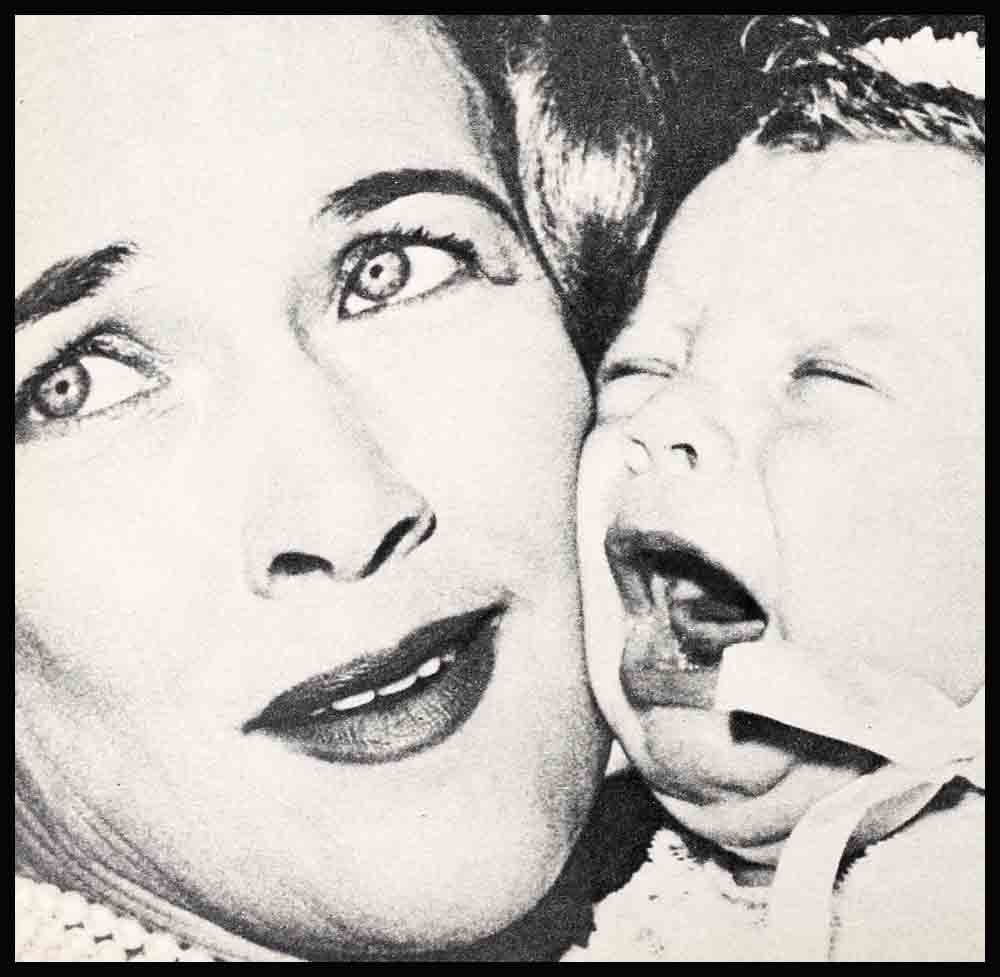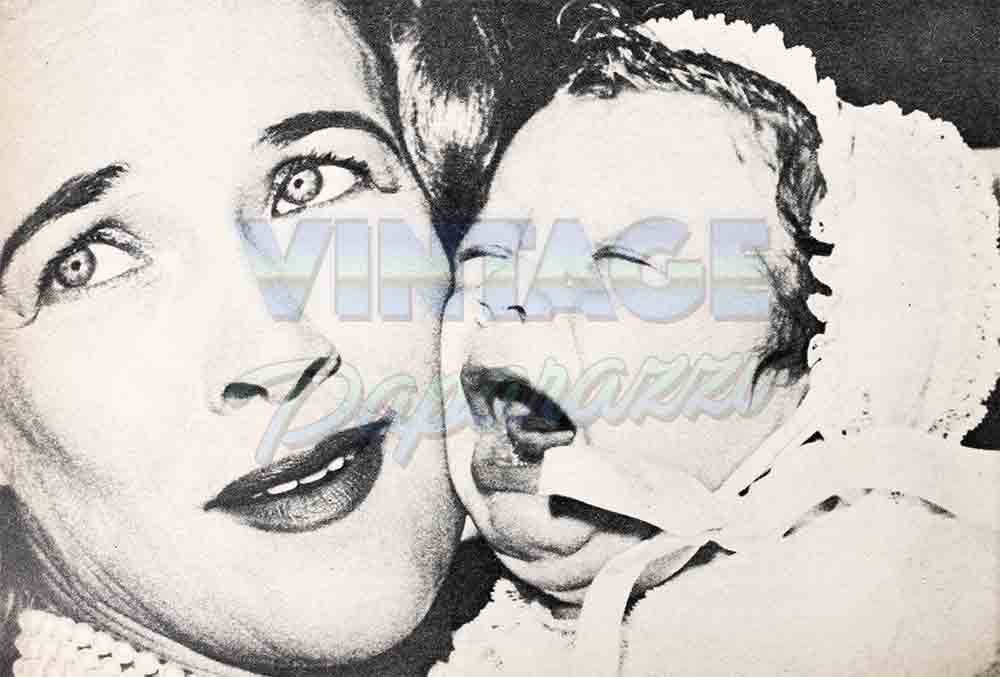
“They Wanted To Steal My Baby!”
Kidnap! An ugly, frightening word. To Kathleen Gable, one recent fail morning, it was the ugliest, most frightening word in the English language. From the moment she first heard it uttered over the phone shortly after dawn, it spelled terror. For Mrs. Clark Gable, a mother’s worst fears had come true. It was a heart-gripping fear which she will never forget.
“It was almost as if I had received a physical blow,” Clark Gable’s beautiful widow told me later. “When the man on the phone said they had learned of a plot, that they wanted to steal my baby, wanted to kidnap Clark’s son, fear knifed right through me. It hit me so hard that for an instant I seemed to stop breathing. What mother can ever forget a terrible moment like that?”
Kathleen Gable has forgotten little about that crisp October morning when a report to the Los Angeles Police touched off one of the biggest kidnap scares since the tragic Lindbergh case. Nor have I.
Within an hour of the time the detectives first notified Kay of the kidnap plot, I was on my way to the Gable ranch in Encino. Kathleen is a long-time close friend of mine. “Come right out, Kendis,” she had told me on the phone.
Things seemed to be normal at the entrance to the twenty-two-acre estate. I pressed the button on the call box by the huge iron gate which guards the front entrance, and identified myself. In a moment the gate, which is electronically controlled from the house, opened just long enough for my car to pass through. As I headed up the familiar winding road I wondered if there shouldn’t be a guard at the gate at a time like this. It was then I spotted another car bearing two detectives.
Apparently they’d been informed I was expected. since they let me pass. But I noticed that they looked me over carefully and even jotted down my license number.
inside the house there was no immediate sign of crisis. However, I noted that the door to the nursery was tightly shut. In the living room an inviting fire crackled in the fireplace. Soft background music, which Clark had always liked, was Corning from the hi-fi in the far corner. Beautiful red Etoile de Hollande roses, a familiar trademark around the Gable house, were arranged in vases about the room. But something new had been added. A husky detective stood quietly in one corner, his alert eyes missing nothing.
Kathleen came out from the kitchen wearing a green cotton cobbler’s apron over her yellow shantung shirtwaist dress. In her hands was a large mixing bowl and a wooden spoon.
She waved the spoon at me in greeting. “I’m creating two magnificent lemon cream pies,” she announced. “I’ve got a lot of extra people to feed here today.” We headed back to the kitchen. “On second thought,” Kay commented, “these pies may not be so magnificent—I just remembered, I’m fresh out of whipping cream.”
Kathleen appeared calm and collected as she competently finished up her culinary masterpieces. She was as beautiful and well groomed as always. But there was a strange tense look about her eyes which revealed the great worry and strain she was under.
Some women go dig in the garden when they’re upset. Others scrub floors, knit furiously or clean out bureau drawers. Mrs. Clark Gable heads for the kitchen and starts cooking. “For some reason, it seems to help me,” Kay explained quietly. “I can’t just sit and wait and wonder. I have to keep my hands busy. As Pa would say, I have to get the job done. He wouldn’t expect me to go all to pieces—he didn’t marry a weak woman.”
There was a pause, then Kay sighed softly. “Oh God, how I wish he were here now. He’d take care of this problem for us.”
Kathleen had indeed been kept busy from the moment she first awakened at six in the morning. It was Thursday, October 26th. She’d slept on a bed in John Clark’s nursery, a practice she always follows when his nurse is off. Her two children by her previous marriage to the late Adolph B. Spreckles, II were asleep in another part of the house. As a treat, twelve-year-old Bunker had been allowed to sleep in his mother’s bedroom, while eleven-year-old Joan was in a room across the hail with Helga, their governess.
“The baby was stirring a bit in his crib and I was standing there in my nightgown admiring him when I was startled by the bell from the front gate,” Kay recalled. “I wondered who it could be at such an early hour. I answered over the call box and a man’s voice informed me he was Sgt. Hatch from the police department and that it was important he see me immediately.
“We’ve always been careful about admitting strangers to the ranch, and particularly so since Clark’s death and the birth of his son. I had no way of knowing if this man was telling the truth. ‘What are you doing at my gate at this hour in the morning—what is so important?’ I asked.
“ ‘Please, Mrs. Gable,’ he replied. ‘This is very urgent.’ Something about his voice told me that it was. He gave me a city hail phone number to call to verify his story. I dialed quickly and was connected with a Sgt. Wooley. By this time I was definitely worried. He assured me Sgt. Hatch was a legitimate officer and had been sent to the house from headquarters.
“ ‘What is this all about?’ I demanded. My concern was rapidly mounting. ‘What are you trying to tell me?’
“ ‘Mrs. Gable,’ he began, ‘are your children all right?’ I didn’t wait for anything more. I dropped the phone and ran back to the nursery. My little sweetheart was sleeping just as I had left him. Then I headed for my room to check on Bunker. I never ran so fast in all my life. The surprised look on Bunker’s sleepy little face when I came sprinting into the room was really something. I didn’t stick around for any conversation. I hustled across the hall to Joan and Helga. They were just getting up and they, too, wondered what I was doing flying about like a frantic mother hen—which, come to think of it, was exactly what I was.
“I was out of breath when I hurried back to the phone and the patiently waiting Sgt. Wooley. ‘My children are all fine,’ I said. ‘Now will you tell me what this is all about.’ Then he explained about the reported kidnap plot and suggested I admit Sgt. Hatch to the house immediately. After quickly putting on a robe I turned the switch for the gate.”
Kathleen smiled slightly as she recalled Sgt. Hatch’s arrival at the front door. “I guess he thinks I’m the most cautious, skeptical woman alive,” she said. “I opened the door only a crack and asked to see his credentials. Then I made him show me his gun. These children are the most precious thing in my life. They are all that matters now, and I know that wherever Pa is, he’s counting on me to take good care of them. I will never take any chances where their safety is concerned.”
Sgt. Hatch was soon joined by other officers who made a thorough check of the house and grounds. Despite Mrs. Gable’s determined effort to remain calm, the veteran detectives were aware of the great shock she felt on hearing that dreaded word, kidnap. They were frank and honest with her and told her everything they knew.
A call had come in at 4:30 A.M. from a man who identified himself as David Treganowan, thirty-four. He said he’d just overheard a conversation between four men in a Los Angeles cafe. “I could be wrong,” Treganowan said, “but it sounded as though they were planning to snatch the Gable baby.”
The men were sober and well dressed, he related, but added that they looked tough. He described them as dark, swarthy types—“the kind you see playing heavies on TV.”
Treganowan willingly came down to the station for further questioning. He explained he heard only bits and snatches of the conversation, but it was enough to convince him to call the police. He thought he heard one of the men remark, “This will make the Gable baby even more famous than his father.”
The men seemed to be discussing a certain back entrance to the ranch and the armed guard permanently employed by Mrs. Gable since John Clark’s birth. Treganowan thought he heard the phrase, “We may have to kill him.” He heard other comments about “the ranch,” “the baby” and “the kid.” The quartet left the restaurant while he was making his call to the police, Treganowan said, and he was unable to get a good look at their car.
Treganowan’s story was enough to cause the police to act. Mrs. Gable’s two attorneys promptly hurried to the station to talk to him. Later, after conferring ; with Kathleen at the ranch, they hired private guards to further augment the police protection. The agency was instructed to send “good, tough men who know how to shoot.”
By this time the tension and excitement was apparent at the ranch. The phone was ringing constantly. Detectives were coming and going. Reporters and photographers had descended on the place. Mrs. Gable was polite, she even offered them coffee. But she was adamant: No interviews, no pictures of the property or the children.
In between all this, she helped Helga rustle up breakfast for everyone. “I’m fresh out of a cook right now,” she explained. Martin, the Gables’ devoted houseman, was busy brewing extra coffee for the detectives. Mrs. Marie Trent, John Clark’s nurse since his birth last March 20th, was obviously worried. Bunker and Joan were bug-eyed over the presence of the policemen and, like any alert youngsters, full of questions.
Bunker, who considers himself the man of the house since the death of his famous step-father, assured his mother she could count on him to handle things. “I’ll get Pa’s .45,” he said. “We can shoot them with that.”
Kathleen couldn’t help smiling. “No, I Bunker. We’re not going to shoot anybody,” she answered. “The officers and God will protect us.”
Sleeping through most of the commotion was the young man who was the cause of it, John Clark Gable. A beautiful, healthy baby, he bears a striking resemblance to his handsome father. His birth, 124 days after Clark’s death, was undoubtedly the most publicized event of its kind in 1961. It had been Gable’s fondest dream to have a son of his own. It is now his widow’s fondest dream to see the boy grow into a man his father would have been proud of.
It was a long, tough day for Kathleen Gable. As darkness fell the tension was definitely telling on her. She relaxed somewhat when the officers assured her that by now the danger of any abduction attempt was slight. As we said good night, Kathleen remarked, “This horrible day might be a blessing in disguise. From now on, there will be somebody watching over the baby every minute. I will keep extra guards on the property and will always be grateful that my little family is safe.”
—KENDIS ROCHLEN
It is a quote. PHOTOPLAY MAGAZINE JANUARY 1962






